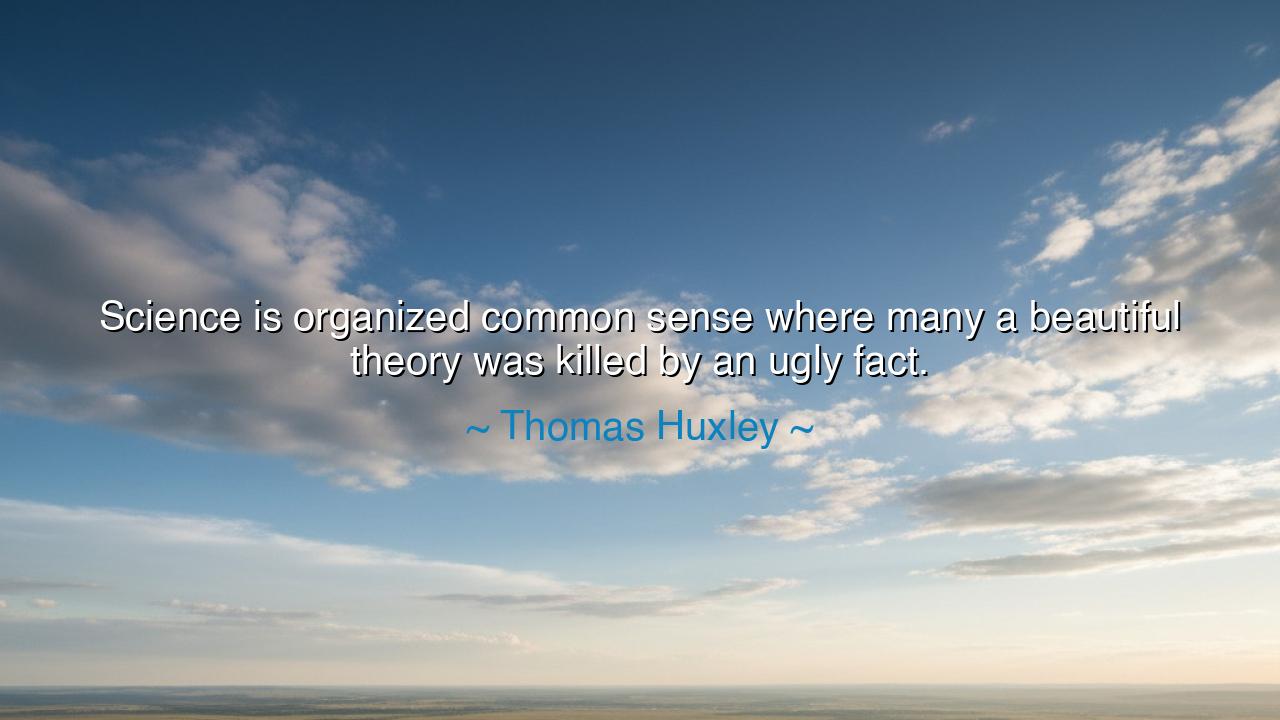
Science is organized common sense where many a beautiful theory
Science is organized common sense where many a beautiful theory was killed by an ugly fact.






"Science is organized common sense where many a beautiful theory was killed by an ugly fact." These words, spoken by the great Thomas Huxley, speak to the very heart of science and its power to reshape our understanding of the world. In his phrase, Huxley captures the tension that exists between the beauty of theory—the imaginative ideas that offer potential explanations of the universe—and the sometimes harsh reality of facts that defy, challenge, or even destroy those ideas. Science, he tells us, is not a pursuit of idealized concepts or romantic notions but a discipline built on the foundation of common sense, grounded in the observable and the tangible, where truth is forged not in the realm of beauty but in the arena of cold, hard facts.
In the ancient world, the pursuit of knowledge was often a marriage of imagination and observation. The Greeks, in their quest to understand the cosmos, created grand theories about the heavens, the elements, and the forces that shaped the world. Aristotle, for instance, crafted elaborate theories on the nature of the universe, seeing the earth as the center of everything. Yet, these theories were eventually overturned by the ugly facts revealed by later thinkers like Copernicus and Galileo, who showed that the earth was not the center of the universe but merely one small planet in a vast, dynamic cosmos. The ancient philosophers, though profound in their thinking, had to learn that knowledge is not just about creating beautiful ideas, but about testing those ideas against the reality of the world. Science is not a realm for the idealization of the mind but a grounding in truth that sometimes shatters even the most poetic of theories.
Huxley’s remark is a reflection of science’s role in confronting the limitations of human thought. For much of human history, we have dreamed of perfect explanations—beautiful theories that tie the world together in simple, elegant narratives. Yet, these dreams have often been dashed by the blunt, ugly facts of nature. The story of Darwin and his theory of evolution is a powerful example. For centuries, the theory of creationism dominated Western thought, presenting a beautiful theory of divine origin and purpose. But Darwin’s groundbreaking observations during his voyage on the Beagle presented an ugly fact—species evolve over time, adapting to their environment in a gradual process of natural selection. This fact, though harsh to many, was the catalyst that reshaped our understanding of life on Earth, replacing ancient myths with the power of empirical evidence.
Consider the work of Einstein, whose theories of relativity revolutionized our understanding of space, time, and gravity. Before Einstein, Newton’s laws of motion and gravity were seen as the foundation of physical science, offering a clear and predictable view of how the universe functioned. Yet, when Einstein introduced his theories, many dismissed them as contrary to common sense, for they contradicted the prevailing theories in ways that seemed illogical. However, the ugly facts—the precise observations of light bending around the sun during a solar eclipse, for instance—proved Einstein's theories correct, forcing a shift in our understanding of time and space. Newtonian theory, though elegant and beautiful, was fundamentally limited, and the ugly facts of relativity shattered it, leading to a deeper and more complex understanding of the cosmos.
Yet, the lesson in Huxley’s quote is not one of discouragement. Rather, it is a reminder of the humility that must accompany the pursuit of knowledge. The beautiful theories we create, no matter how compelling, must always be subject to criticism, examination, and the testing of facts. The facts may not always be beautiful—they may be difficult, inconvenient, or uncomfortable—but they are the foundation upon which the true knowledge of the universe is built. Science does not glorify the ideal or the imagined; it honors the real, the observed, and the verifiable. It calls us to abandon our assumptions and embrace the truth, no matter how it challenges the theories we hold dear.
In your own life, think about how you approach knowledge and ideas. Do you hold onto your theories, even when they are challenged by uncomfortable facts? Or do you have the courage to rethink your beliefs, to adapt your understanding in the face of new evidence? Like Huxley, we must recognize that the pursuit of truth is not a process of confirming what we want to believe, but of confronting the facts—those sometimes harsh, sometimes ugly truths—that bring us closer to a deeper understanding of the world. Theories may offer beauty and coherence, but it is the facts that bring us closer to reality.
Huxley’s wisdom calls us to approach science and knowledge with both passion and objectivity. We must be willing to accept the challenge of ugly facts, even when they disrupt our cherished beliefs and theories. Yet, we must also remember that facts alone are not enough. Science requires the creativity to form ideas, the vision to explore the unknown, and the bravery to face the facts as they are, not as we wish them to be. Just as Huxley and other great minds did, we too must embrace the tension between the beauty of theory and the ugliness of facts, for it is this balance that leads us to the true understanding of the world.






AAdministratorAdministrator
Welcome, honored guests. Please leave a comment, we will respond soon